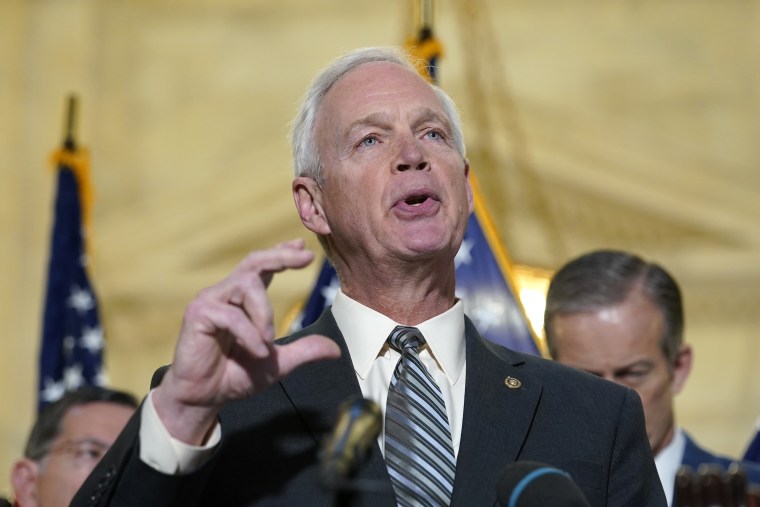It was seven weeks ago when Sen. Ron Johnson surprised much of the political world with an unexpectedly moderate position. As the Senate prepared to consider the Respect for Marriage Act, codifying the Supreme Court’s Obergefell v. Hodges ruling in federal law, the Wisconsin Republican said he was prepared to support the Democratic legislation.
To be sure, the GOP lawmaker didn’t exactly seem happy about it. In a written statement, Johnson panned the bill as largely pointless. He nevertheless concluded, “Even though I feel the Respect for Marriage Act is unnecessary, should it come before the Senate, I see no reason to oppose it.”
The refreshing position was not entirely inexplicable. Johnson is running for re-election in a battleground state, and he’d likely benefit from voting for a popular, bipartisan measure. What’s more, his home state colleague, Sen. Tammy Baldwin, has taken a leading role in advancing the bill — the Democratic senator is the chamber’s first lesbian member — and Johnson might've realized that it’d be respectful and classy for Johnson to join her on this legislation.
And yet, after saying he saw “no reason to oppose” the bill in late July, the Republican has apparently changed his mind. The Milwaukee Journal Sentinel reported:
Johnson in recent weeks has noted he “never said” he would support the bill and indicated he has reservations over how the legislation could impact religious protections. But speaking at a public meeting in Hartford last week, the Oshkosh Republican was definitive — saying he would not support the Respect for Marriage Act in its current form and indicating he believes the Supreme Court case giving same-sex couples the right to marry was “wrongly decided.”
What about the written statement the GOP incumbent issued seven weeks ago? Johnson effectively admitted that he’d been deliberately dishonest, telling voters that he only issued that statement to get journalists to stop bothering.
“So you just get hounded on this crap, right?” the senator said, deriding the civil rights issue as unimportant. “So just to get them off my backs, I wrote a press release, and I said I always supported civil unions. Never felt that we needed to do anything other than that.”
The political debate over marriage equality returned to the fore in earnest in June, when Justice Clarence Thomas wrote a concurring opinion arguing that Obergefell ruling, among others, was “demonstrably erroneous” and should be “reconsidered.”
In his public remarks, Johnson said the far-right justice was “probably right,” though the senator added that he doesn’t expect the high court to overturn its marriage equality ruling.
The Republican went on to criticize Baldwin for “opening that wound and opening that debate” — as if the Democratic senator were to blame for Thomas’ legal opinion.
What’s more, let’s not forget that Thomas wasn’t the only one picking this fight. Two Republican state parties recently approved new policy platforms denouncing same-sex marriage, and soon after, Sen. Ted Cruz used his podcast to insist the Supreme Court’s Obergefell ruling was “clearly wrong.”
A variety of GOP senators have followed suit, announcing their opposition to marriage equality, the Supreme Court’s ruling and public opinion notwithstanding.
So what happens now? In July, the House passed the Respect for Marriage Act, and at the time, 47 Republicans sided with a unanimous Democratic majority to advance the legislation. Attention then shifted to the Senate, where three GOP members — Ohio’s Rob Portman, Maine’s Susan Collins, and North Carolina’s Thom Tillis — said they’re also on board with the measure.
Johnson appeared to be a fourth “yes” vote, though that’s clearly no longer the case. Indeed, with the Wisconsinite changing direction, optimism about the bill's prospects is waning.
The question is not whether a majority of the Senate supports the bill; the question is whether proponents can find seven Republicans willing to break ranks, end a GOP filibuster, and allow an up-or-down vote.
Senate Majority Leader Chuck Schumer told reporters this afternoon to expect floor action on the bill “in the coming weeks.” Watch this space.

